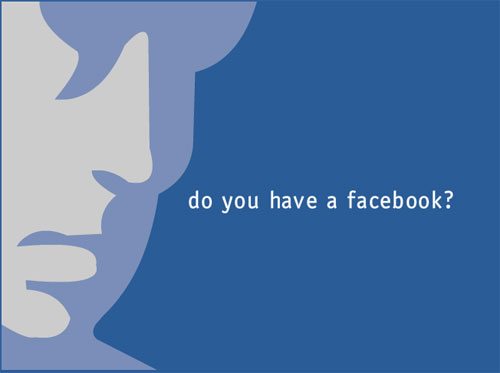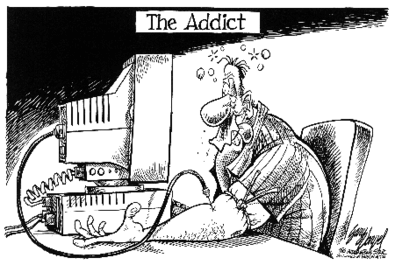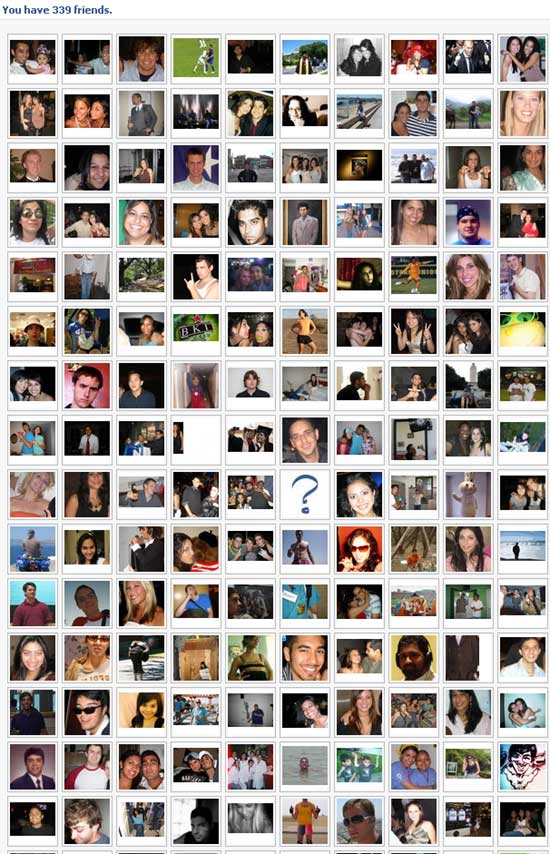Courses/Computer Science/CPSC 203/CPSC 203 2007Fall L04/CPSC 203 2007Fall L04 TermProjects/Facebookers Anonymous
Contents
Introduction
Group members:
Bettina Rellosa, Aymen Zia, Douglas Carr, Ricky Lail
Team:
Intel Insiders
Initial project Statement:
We will be looking into the Facebook addiction of today's generation and what it is that makes Facebook so addicting.
What is Facebook?
Facebook is a "social utility", rather than a social networking website, as stated by Mark Zuckerberg, the founder of Facebook, that connects people with friends and others who work, study and live around them. People can use Facebook to keep up with their friends, upload unlimited number of photos, share links and videos, and learn more about the people they meet.
Originally called thefacebook, Facebook was founded by former-Harvard student Mark Zuckerberg, who ran it as one of his hobby projects with some financial help from Eduardo Saverin. Since their launch in February 2004, they’ve been able to obtain over 50 million active users as of November 2007, with more than 150,000 new users signing up daily. More than 10%-15% of the population of Canada is now on the website and London, U.K., being the largest networks of Facebook consists of more than 1.5 million users.
Who Can Join Facebook?
Anyone can join Facebook, all that’s required is a valid email address to join it. To connect with coworkers or classmates, you can use your school or work email address to register. Once you are registered, you are able to join a regional network to connect with the people in your area.
What Does Facebook Offer?
- Networks- each based around a company, region, or school.
- Upload photos and videos
- The wall- It is a space on each user's profile page that allows friends to post messages for the user to see.
- Events- A way for members to let friends know about upcoming events in their community and to organize social gatherings.
- Marketplace- Allowing users to post free classified ads.
- Many other applications, such as Gifts, Notes, and Music on your profile.
Facebook is packed with information about your friends, family and community. It offers a wide variety of applications that never lets you get bored, which also means quite a useful alternative to homework for students and workers, and is now leading to an addiction problem around the globe.
Who is addicted to Facebook?
10 Signs You're Addicted to Facebook
10. You feel popular when someone “tags” you in a photo (it shows others that you do actually get out).
9. The mini-feed was a hot topic of discussion for a while among your friends.
8. You think “poking” is a valid form of flirting.
7. You have Facebook “friends” that you’ve never met in person.
6. As soon as you meet someone in real life, you go home to search for them on Facebook.
5. You feel cheated now that everyone can join.
4. You have pressured someone to join just so you can “friend” them.
3. You think your image is controlled by your profile picture.
2. You’ve created a group and evangelized everyone to join.
1. You think that wishing someone “happy birthday” on their wall is sufficient.
And as a bonus… 0. You want to be the first Facebook dating “success story.”
So who uses Facebook?
According to Michael Arrington of TechCrunch "85% of College Students use Facebook. The penetration rate is staggering - about 85% of students in supported colleges have a profile up on Facebook. That’s 3.85 million members. Chris [Hughes] states that 60% log in daily. About 85% log in at least once a week, and 93% log in at least once a month".
The International Herald Tribune reports: Facebook, the popular social networking Web site that has focused on college students, is preparing to open its membership to everyone. The move is meant to help the site expand, but it risks undercutting one of its attractions: It has been more exclusive and somewhat more protected than MySpace, its larger and more freewheeling rival.
Just recently, high school students were allowed to be Facebook members Michael Arrington of TechCrunch continues, "With the addition of high schools - there are approximately 22,000 in the U.S., Facebook’s target market increases substantially. Chris states that "tens of thousands of high school students have joined since the functionality was launched last friday".
Aside from students, who else is on FaceBook?
A blog on the web by a guy named Niall Kennedy says "Popular social networking site Facebook is moving beyond schools and into the workplace. A new version of the site went live this morning allowing new registrations on corporate e-mail addresses. I was able to signup using my Microsoft address and completed my profile". He follows up with this comment: "My Microsoft social network on the site is currently filled with recent graduates who most likely had a profile before entering the full-time workforce but I expect more users of all ages jumping in soon to see what all the fuss is about".
An increase in the usage of Facebook in the corporate world is obvious because offices have started blocking the said site on their computers. Mashable, a social networking news site reports: "Is corporate America banning Facebook at the office? According to a study conducted by Sophos, a securities company, 45% of workers surveyed have indicated that their employers block access to Facebook. Another 7% indicate that access is restricted depending on the particular job’s necessity to access the Facebook social network". They added reasons for the blocking: "Executives polled have noted that getting on Facebook at work is a drain to productivity, as well as a security issue for a business’ shared computer system and the company brand itself, should a wayward employee reveal too much information".
Useful Information
Simon Santow of ABC News reports: "The social networking website Facebook may have carved itself a future as a $10 billion time-waster. An estimated over 150,000 people are joining Facebook every day - a massive potential market. Now the Wall Street Journal says the multi-billion-dollar corporations Microsoft and Google are chasing a slice of the Facebook action. Not bad for a site whose attractions have had many big employers fuming at the way it chews up people's time".
Facebook statistics as reported by TheStar.com
"Facebook statistics show that from April 2006 to April 2007, the number of unique visitors to the site increased in all age categories. The 45-to-54 and 55-to-64 age categories are up 63 per cent and 83 per cent, respectively. However, the 18-to-24 age category has only increased 30 per cent, suggesting that mom and dad are catching up to the 11.7 million Facebook visitors under the age of 25. The two age groups that have grown the most are 12 to 17 and 35 to 44. Basically, everybody and their mother seem to be on Facebook".
What components of Facebook make it addictive?
As stated above, more and more people are hopping on the facebook bandwagon. New users are joining by the thousands and are each becoming hooked on this latest phenomena. The occasional individual will look at this fad and not be mesmerized in the least. But these “individuals” are becoming harder and harder to find as it is becoming more socially acceptable to spend countless hours surfing the site. But what does this online social networking site offer that makes it so hard to abandon? Easy, it has something appealing for everyone. Some of the reason people keep comin back are:
- Increase Social Life and Popularity
This constant need to check your Facebook page is fuelled by the fact that today's generations need to feel “cool” by constantly updating their pages and letting the rest of their friends and colleagues know everything exciting happening in their lives. Almost every Facebooker is guilty of spending countless hours perfecting their profile so that it is appealing to everyone else. Whether its somebody writing on your wall or sending you a poke or just visitng your page, it all translates into attention. Who wants to be the person with only 10 friends and nothing written on their wall?
- Meeting Old Friends
In a matter of minutes if not seconds, you can find junior high school friends or past co-workers or even lost family and do years of catching up. Facebook is a great way to re-build these lost connections and keep in touch with everyone who you want to stay close to.
- Sharing Information
Instead of sending picture after picture through e-mails, an album can be created and pictures can be easily copied. Other information comes in the form of communication. Leaving quick reminders or telling a whole group of friends has become so much easier. Events can be planned out without calling every single person and knowing if they are gonna be there, they can RSVP with the click of the mouse and the event can be planned out accordingly. Group members and fellow classmates in your university course can be easily contacted through university networks and it is much easier to ask for help and recieve a quick response.
- All Those Applications
Thousands of different applications add a little bit of fun and excitement to Facebook. There is applications for almost everything imaginable. Games, sports, news, tv shows & movies, etc. will all keep you entertained while personalizing your page and interacting you with your friends. These private applications are bringing in well-known, successful companies along with the average joe who wants to create the latest popular application. Forbes, iLike and Ford Models all launched applicatons in Facebook to just name a few.
What are the effects of this addiction?
Without doubt, Facebook has positives, such as the ability to keep up with friends, but people tend to overuse Facebook to the point of addiction. As with any addiction, an addiction to Facebook has significant costs. These costs are not necessarily monetary, although there is certainly an affect on the economy in any addiction. The largest cost of an addiction to Facebook is time. Time that you are on Facebook is time that you aren't doing something that is, in most cases, more productive. To illustrate this point, COM Score states that Facebook is the 7th-most trafficked website in the United States. That amounts to a significant amount of time spent accessing Facebook. College student Jeff Bethune describes one affect of this addiction to a student, stating "I'm a closet addict," he confessed. "I don't want to do homework but I want to go on [Facebook] everyday. I don't want to miss out on something."
Facebook addiction is like a nicotine addiction: it removes productivity from the office but in a much less obvious way. Everybody in your office knows if you went out to smoke and can get on you to get back to work. In an office job, employees can end up facebook for hours getting no work done and costing their company money without anyone knowing. According to a study conducted by Sophos, a securities company, 45% of workers surveyed have indicated that their employers block access to Facebook. Another 7% indicate that access is restricted depending on the particular job’s necessity to access the Facebook social network.
Facebook addiction also can cause people to place things they may not want everyone online where anyone can see them. RollingStone.com reports that North Carolina State and North Kentucky University both disciplined underage students who posted photos of them drinking on the networking site. A student at Alabama-Birmingham posted on his friend's page that "It is time to reconvene the season of evil!" Later that year the student was arrested along with two other students for setting fire to nine Alabama churches. The aforementioned Sophos survey found that 41% of Facebook users would share personal information with anybody on the site, even a complete stranger.
Another cost to the addiction to an online site enabling you to meet people and talk to friends is that it can inhibit a person's real life social skills. If someone is constantly on Facebook they aren't out doing something enabling them to meet face-to-face. On top of that, people can present a facade online where no one can truly see them, yet when they get into a situation where they actually meet people they are extremely awkward. Online friendships may also have the affect of reducing a person's desire to make a friend they actually hang out with, so they may end up becoming a modern day hermit (for lack of a better term).
And finally, some good advice from columnist Lauren Hollister: "If you're a member of every group imaginable then yes, you're past the point of no return. If you spend your evenings on Facebook rather than studying or spending time with friends, then you've crossed the line. If your goal is to poke everyone in sight and be poked back, then you most definitely need a life and need to leave Facebook for your own good. Don't waste time poking people when you could be out having fun with your friends. Use Facebook as a network but don't let your life revolve around it and your latest friend request".
Conclusion
There is no doubt that today's generation IS addicted to Facebook. This addiction has both good and bad effects. The positives being: an easier connection between friends and family members (especially those who are far away) and as a tool for communication among your Facebook friends. The downside to this addiction is that its obviously time-consuming. As seen in the examples stated above, Facebook is taking up a lot of people's time and attention which distracts them from doing their work and other activities that they should have been doing. Facebook is an effective tool for connecting with people around you but it has to be done in moderation.
Sources
(Doug)
http://www.facebookaddiction.com http://media.www.smithsophian.com/media/storage/paper587/news/2006/02/24/Opinions/The-Dangers.Of.Facebook.Addiction-1637444.shtml http://www.volanteonline.com/news/2005/10/05/Opinion/Facebook.Addiction.Is.Needless.Yet.Compelling-1008873.shtml http://www.thehurricaneonline.com/news/2004/11/02/News/Facebook.Addiction.Runs.Wild-789263.shtml http://www.commoncraft.com/facebook-addiction-and-new-news http://okayfacebookme.blogspot.com/2006/03/facebook-addiction-quantitative-many.html http://www.youtube.com/watch?v=B2XY4FnjiPY http://www.dailymotion.com/video/x1hvsk_facebook-addictionfunny_ads http://www.lewisflyer.com/news/2006/05/12/News/Panelists.Discuss.Facebook.Addiction-1922727.shtml http://www.blainekendall.com/index.php/archives/2007/03/16/facebook-addiction/
(Bettina)
http://www.techcrunch.com/2005/09/07/85-of-college-students-use-facebook/ http://www.iht.com/articles/2006/09/12/business/facebook.php http://mashable.com/2007/08/22/facebook-office-ban/ http://www.niallkennedy.com/blog/archives/2006/04/facebook-enters.html http://abc.net.au/news/stories/2007/09/26/2043500.htm http://www.propeller.com/viewstory/2007/07/30/10-signs-youre-addicted-to-facebook/?url=http%3A%2F%2Fimperishableinheritance.com%2F2007%2F10-signs-youre-addicted-to-facebook%2F&frame=true http://www.thestar.com/living/article/220102 http://www.thenetworkgarden.blogs.com http://blog.searchanyway.com/img2/facebook http://www.rhettsmith.com/blog/archives/images/addict_varvel-thumb
(Ricky)
http://facebookforum.wordpress.com/2007/10/16/facebook-forum/ http://danielfranklingomez.com/blog/2007/10/04/facebook-addicts-anonymous/ http://facebookstalker.wikia.com/wiki/How_to_Know_You_are_Addicted_to_Facebook http://winnipegfreepress.com/breakingnews/story/4037533p-4647205c.html http://www.news.com.au/couriermail/story/0,23739,22277003-23272,00.html http://www.telegraph.co.uk/opinion/main.jhtml?xml=/opinion/2007/06/16/do1604.xml http://www.miodestino.co.uk/blog/2007/05/27/addicted-to-facebook/ http://www.news24.com/News24/Columnists/Bryan_Porter/0,,2-1630-2152_2170420,00.html http://www.personneltoday.com/Articles/2007/09/12/42085/facebook-and-myspace-are-the-new-social-networks.html http://www.facebookobserver.com/uncategorized/time-to-quit-facebook/
(Aymen)
http://www.commoncraft.com/facebook-addiction-and-new-news http://www.silicon.com/ciojury/0,3800003161,39168320,00.htm http://www.mustangdaily.net/news/2006/11/09/Opinion/Is.Your.Facebook.Addiction.Properly.Fed-2449048.shtml http://www.mydigitallife.co.za/index.php?option=com_content&task=view&id=2586&Itemid=43 http://www.digitalbathroom.com/index.php?/archives/8-my-facebook-addiction....html http://feedraider.com/item/1074714/e-Learning-Acupuncture/The-Facebook-Addiction/ http://www.areavoices.com/student/?blog=4760 http://www.msnbc.msn.com/id/20227872/site/newsweek http://www.msnbc.msn.com/id/19937202/ http://www.quantcast.com/facebook.com http://bulletin.ninemsn.com.au/article.aspx?id=287814 http://www.facebookprofile.com/wp-content/uploads/facebook-friends-tiles http://msnbcmedia2.msn.com/j/msnbc/Components/Photos/070528/070528_facebook_hmed_10a.hmedium



